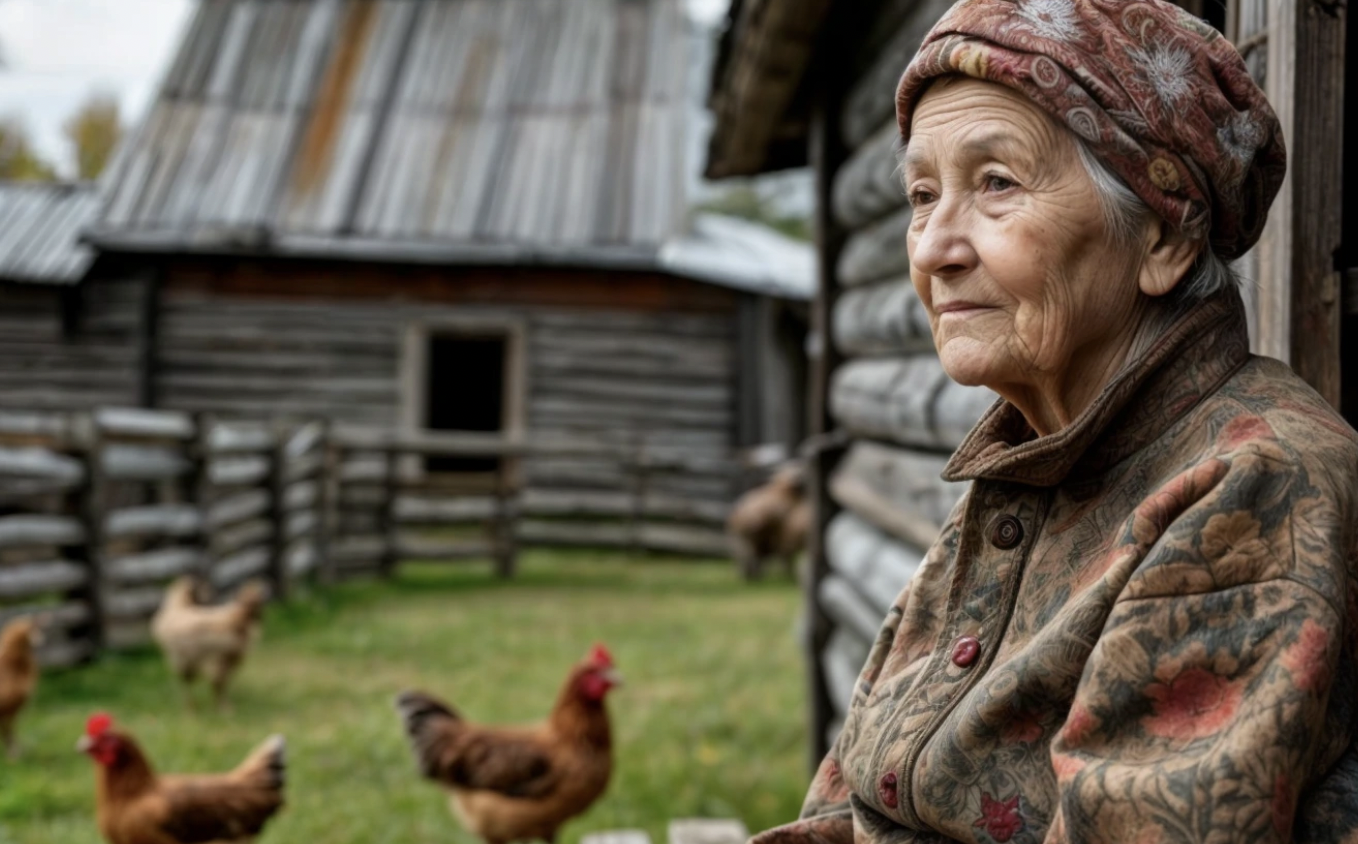Olga sat on the steps of her house, stroking the worn wooden railing and feeling the pain in her back from the long hours of work in the garden growing sharper. Raising her eyes, she heard her daughter’s voice.
— Mom! Where are you?
Olga sighed heavily, slowly got up, slightly straightening her aching back, and made her way to the gate. There, her grandson Lenya was already waiting, rushing toward her with joy. Olga opened her arms and, feeling warmth in her chest, hugged him tightly.
— And here you are, my little bunny! — she said, affectionately embracing Lenya.
— We brought groceries; you’ll have everything you need. Let’s go inside, — suggested her daughter.
Olga felt a sharp pain in her back but gritted her teeth. She knew there was no choice. They entered the house, and the usual scene began: talks about shopping, future plans. However, Olga felt a sense of unease in her heart — something about her daughter’s behavior seemed strange, as if she hadn’t come just for a visit.
After dinner, when Lenya had fallen asleep quickly, Vasilisa spoke carefully:
— Mom, I need to talk to you. Olga sensed that this conversation would be important and put down her spoon. — Has something happened? Why are you acting so strangely? — Olga asked, looking at her daughter. — No, nothing special, — Vasilisa replied, though there was an underlying concern in her voice. — Nikita and I are thinking about buying a new, spacious apartment. You see, we want more children. But we can’t afford the mortgage. We could sell your house. Nikita suggested you move in with us. You’ll have your own room, no need to heat the stove or carry water from the well. Olga listened quietly. She knew the house was old, and she no longer had the strength to keep it in order. But her heart refused to accept the idea of leaving these walls. There were too many memories here. She was afraid of losing her connection to this place, to this house that had become part of her life.
— Mom, you know that here you’re alone. No one can help. It will be easier for you with us, and you’ll be able to rest too, — Vasilisa continued. Besides, Lenya loves you so much, and soon there will be a granddaughter or a grandson.
Inside, Olga felt turmoil. Yes, she knew the house needed constant care, but she had always found meaning in taking care of it, just as she took care of her family. She had never liked the city, the fast pace of life there.
Olga sat on an old wooden chair, gazing out the window where the sun was already setting beyond the horizon. A light breeze caressed her face, and she pressed her palms to her warm knees, sinking into memories of the years gone by.
Once, her life had been very different. She remembered her husband, how he worked in the garden, how he came home with a heavy bag full of tools, and how a light smile would appear on his face when he greeted her. He had been her support, her pillar. Everything in the house had been connected to him — his footsteps, his scent, his voice. And even when their children grew up and moved away, they remained together in their home.
Olga often thought about how they had built this house together, how they carried each board, how they planted trees in the garden, and then rejoiced in their harvest. Every room, every corner of the house held pieces of their life, their labor, and their happiness. Denis had been not only her husband but also a close friend, someone with whom she could share everything, experience life, and cherish every day. Even when illness began to take its toll on him, when his strength started to fade, he remained the person who always supported her.
“How can I leave all of this now?” — Olga wondered, thinking of him.
The decision to sell the house had been the final step for her, but it had been incredibly difficult. She wasn’t just giving up walls and bricks; she was losing a piece of herself, a fragment of her history.
After much thought, Olga agreed.
In the morning, she told her daughter. Upon hearing the news, Vasilisa noticeably brightened and ran outside to call her husband.
After Olga parted with her home, her life changed. She had long felt that she couldn’t handle the big things alone, but she had somehow continued to carry on.
The proceeds from the sale of the house were immediately divided among her children. Although she didn’t expect much gratitude, her conscience wouldn’t allow her to keep the money for herself. She invested it in her children’s future, leaving little for herself.
First, she lived with her son, as her daughter and son-in-law needed time to find an apartment. It felt strange — living not in her own home but in someone else’s, even though it was with a close relative. But in the city, she quickly realized that life was much more convenient. Everything was nearby: shops, pharmacies, hospitals. No need to carry water from the well, no need to heat the stove or worry about pipes freezing in the winter. She liked how quickly problems could be solved — everything was within reach. At first, she even thought that city life suited her, and she almost didn’t miss her old home.
Nevertheless, Olga decided to move in with her daughter once she settled into her new apartment. After all, her family needed her help, and she felt that she could be useful. So, she moved into a new, still uninhabited space, where she would spend the rest of her life.
The apartment was spacious and cozy, and Olga was happy to help her daughter with the housework. Time passed, and soon Vasilisa and Nikita had a little girl. Little Yulia brought so much joy and smiles into the house that Olga felt like she was rediscovering her zest for life. She helped with the baby, cooked meals, did the laundry, cleaned — just as she had before. It seemed like life had settled again, and the grandchildren had become her new joy.
But when Yulia grew up and went to kindergarten, things in the house began to change. Olga noticed that Vasilisa, though she didn’t say it directly, was becoming more irritable. She began complaining about little things, snapping at her mother over trivial matters. Her whole life seemed to revolve around the kids, work, and household chores, and despite all Olga’s help, she no longer seemed as important as she once had been.
— You did it wrong again! Can’t you see how tired I am? — Vasilisa snapped one day, reproaching her for not having cleaned the floor in Yulia’s room before the kids arrived. — Can’t you at least pay attention to what I’m saying?
Olga was confused. She didn’t understand why it had become so hard for her daughter to communicate with her. She had tried, helped as much as she could, but her efforts were no longer appreciated. Just recently, she had been the main helper in the house, and now it felt as if there was no place for her in her daughter’s life.
More and more, Olga noticed how Vasilisa turned away when she asked for something. She would snap for no reason, even when there was no real cause. Olga felt hurt. She had done everything for the children and wanted her care to be valued. But now it seemed like it didn’t matter.
— How much longer, mom? — Vasilisa said one day when Olga offered to help with the cleaning. — I’d rather do it myself. Just leave me alone.
These words hurt Olga deeply. She felt as though her life, her efforts, all her help were now seen as a burden. Vasilisa was no longer the caring daughter who greeted her with a smile when she first arrived.
Olga understood that her presence was becoming less and less needed. And though she didn’t want to think that way, she felt that soon she would have to find a new place for herself.
Olga thought long and hard and finally made the decision to move in with her son. She no longer had any doubts — her daughter was becoming more irritable, and her role in the house was shrinking every day. Vasilisa’s words, “Leave me alone,” had deeply hurt Olga. She realized that her presence was no longer required. As much as she wanted to stay with her daughter and help, she understood that the time had come for her life in this house to end.
She called her son.
— Vanya, can I come stay with you for a while? — her voice was quiet but firm.
— Of course, mom, — he replied, as if he had been expecting the call. — A couple of weeks ago, your sister suggested bringing you over. I know things haven’t been easy with her. Come, we have space.
These words brought relief to Olga. Her son didn’t mind her coming, even though she had tried to avoid the moment when she would feel “unnecessary” to her children. As he said, a few weeks ago, Vasilisa had called him to offer to bring her mother over, but he hadn’t intervened, thinking the issue wasn’t urgent. Now, he was ready to lend a hand.
After packing her things and thinking about what to bring, Olga set off. Despite her fatigue and heavy thoughts, her heart felt a little lighter. She didn’t know how long she would stay with her son, but at least there, someone would appreciate her presence.
Her son greeted her calmly but warmly, as always. His wife, Anna, also showed no objections. However, the apartment was cramped — a two-room place, and she had to sleep on a fold-out bed in the room where little Vanya and Anna’s daughter slept. This didn’t surprise Olga; she had long been accustomed to finding a place in the corner when she was older, with little room to stretch. Everything felt temporary, but she understood — it was better than being completely alone.
— It’s fine, mom, — said her son when she unpacked. — Don’t worry, I know it’s not easy for you. Stay with us; it’s not a problem.
Olga couldn’t shake the feeling that her stay there was temporary. She constantly thought that maybe at some point, Vanya and Anna would also start getting irritated, as there was now another person in their lives. But for now, everything was calm. Vanya worked as usual, and Anna took care of the child. Olga tried to help, watching the granddaughter as best as she could, cooking, cleaning.
But slowly, despite the outward politeness, she began to feel that her place in the house was becoming more of an extra burden than a part of the family. Life in the city was different: for Anna, the fast pace mattered more, and she was busy with the kids and work, often not noticing Olga. Sometimes she would look at her with mild discontent when she did something the way she didn’t want.
Often, Olga sat in her room, thinking about how strange everything had changed. She remembered her husband, with whom she once shared a home, how they worked together, how they were supported by strong love. Olga realized she didn’t know what her life would be like next. Instead of feeling part of the family, she once again found herself in the role of a temporary guest.
She decided she couldn’t keep going like this, and, feeling her last strength leave her, she packed up and went to the village to stay with her old neighbor. She was the only one who could understand her. And she left a note for her son. “I’m not needed, but I’m still alive. It’s better to live with strangers than with such close ones. Be happy.”
But when she got there, she saw that the house was clearly abandoned. At that moment, it seemed to her that everything she had once loved was gone.
While walking down the street, she noticed someone sitting on the porch of her old house. A man with a fish in his hands. Olga stopped, as if turned to stone.
— Are you here for me? — asked the man, looking up.
— I used to live here, — Olga said in surprise.
The man wiped his hands on his pants and invited her inside. He turned out to be the new owner of the house, and after hearing her story, he invited her to stay. Upon entering the house she had once left, Olga suddenly felt that this stranger genuinely cared for her.
— I often come here to rest, and it will be warmer if you stay in the house, — said the man, whose name was Dmitry. — I’m alone, I don’t have a family. After my wife and daughter left, I couldn’t stay in the apartment on weekends. I tried to get away or help someone. Then I realized I wanted a little house in the village. There’s always something to do here. And when I bought this house, it felt like my soul had calmed down. It’s so nice here that I didn’t change anything or renovate. And who else, if not you, will keep this warmth in it? I’ve always dreamed of someone taking care of this house. Maybe it will be convenient for you to stay?
Olga didn’t know what to say. The offer was so unexpected that she felt care and concern in it. And maybe this was her new life.
Soon, Dmitry became like a son to Olga. He helped her with the house, drove her to appointments, and took care of her health. He often brought her medicine for her back and cared for her as a close person. A year passed, and Olga’s life with Dmitry became fulfilling. She helped around the house, baked pies, walked with the neighbor’s kids who came for the summer. Olga felt that her life had gained meaning again. She was no longer unnecessary to anyone, no longer wandering through her children’s homes, but living in a place that had become her home again.
Her old house had become not just a place of memories, but a place where she found a new family. And one day Dmitry came not alone, but with a woman and a boy about seven years old. Matvei, Nadia’s son, became Olga’s first assistant in the house. Soon little Olenka was born, bringing even more joy to the house. Olga realized that everything she had been through had not been in vain. Life went on, and she found new happiness in it.
She didn’t call her children. She just gave Dmitry their addresses so he could notify them when she was gone. Dmitry scolded her, saying that Olga wasn’t ready to think about that yet, that now he couldn’t do without her and gave her a big hug.



